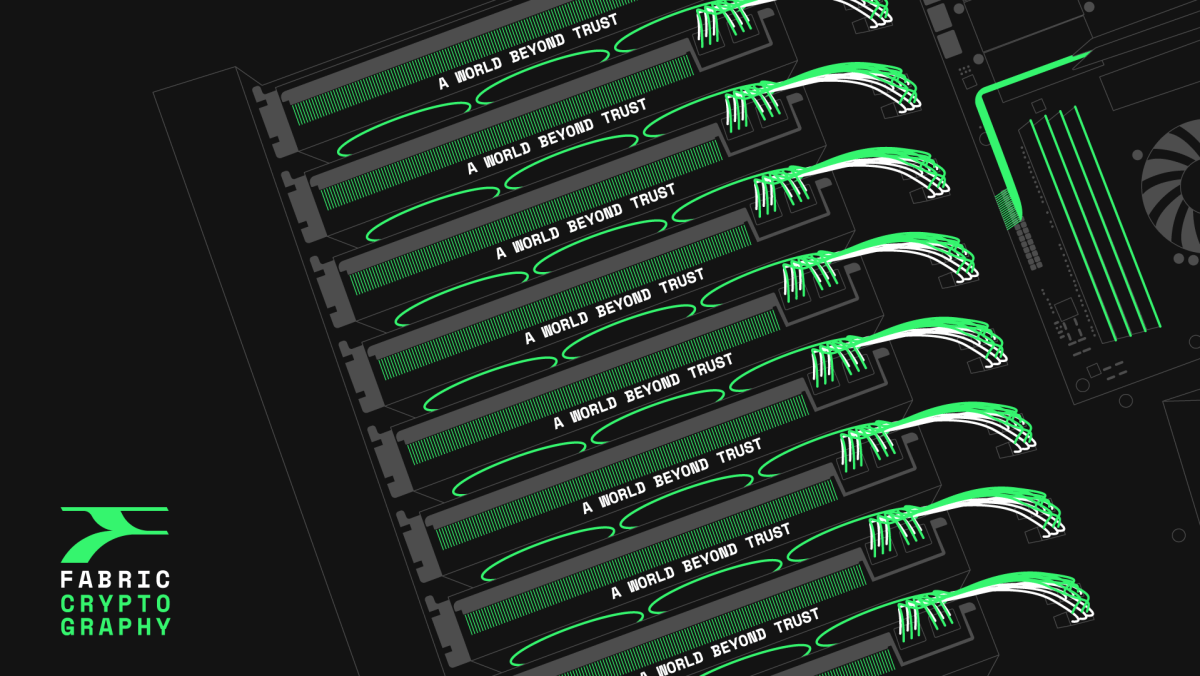Fabric Cryptography, a hardware startup by MIT and Stanford dropouts (and married couple) Michael Gao and Tina Ju, wants to make modern cryptographic techniques like zero-knowledge proof (which lets you prove things without giving up exactly what you know) and fully homomorphic encryption (which enables you to work with encrypted data without decrypting it) ubiquitous. This, the co-founders argue, will ease what they see as a fundamental tension between trust and privacy in an age where companies gather increasing amounts of data about consumers, yet are also increasingly unable to safeguard this data.
To prove this out, the team has developed a custom RISC-V-based chip that is optimized to run the algorithms necessary to establish zero-knowledge proofs and enable fully homomorphic encryption. Fabric calls this a “verifiable processing unit” (VPU). Existing hardware, the team says, is simply too slow to make things like fully homomorphic encryption ubiquitous, so it takes custom chips to make this happen.
A number of VCs are now also backing its idea, with Blockchain Capital and 1kx leading the company’s $33 million Series A round. Offchain Labs, Polygon and Matter Labs also participated. It follows a $6 million seed round led by Metaplanet with participation from the likes of Inflection and Liquid2 Ventures.

The fact that there are several crypto investors here investing in cryptography is no coincidence. “We could not be more thrilled to partner with Fabric on their mission to accelerate all cryptographic operations with the world’s first VPU to help bring about a world where privacy and verifiability are non-negotiable components of all digital systems,” said Yuan Han Li, an investor at Blockchain Capital.
While Fabric has its sights set on enterprises, the market with the most immediate need for its solution is the blockchain space, which is also why its first-generation chip will focus on zero-knowledge proofs.
“With zero-knowledge proofs and fully homomorphic encryption, it’s really starting to look like AI in the 2010s, with exponentially increasing compute demand,” Gao told me. “You can tell that although not everyone understands what it is, it’s increasing in ubiquity already within the crypto space. And we think that it goes beyond crypto. It goes to pervasive cryptography in the enterprise. And so we realized that this is really a mainstream moment, and hardware could be the final accelerant that pushes it over the edge and allows cryptographers to make their dreams come true. That’s why Tina and I teamed up and started this company.”
Fabric says it already received “tens of millions of dollars in preorders.”
Enterprises don’t want to deal with “the toxic sludge of user data,” either, Ju noted, because for the most part, it’s a liability. So if they can keep that data encrypted, even while in use, or not even have to get it and instead exchange only what’s necessary through zero-knowledge proofs, that’s a massive win for them.
Gao is no stranger to ambitious hardware startups. He previously co-founded photonic AI startup Luminous Computing. He then also co-founded the Bitcoin mining chip startup Katana in 2021 and stepped in as CEO in 2022. Katana rebranded as Fabric Systems. Fabric Systems is now defunct, but some of its DNA seems to live on in Fabric Cryptography.
The couple’s experience at Luminous, though, may have been somewhat of a wake-up call. “We were both disillusioned that, despite my personal excitement about large language models, and despite the vast potential of AI in general … the most practical go-to-market for photonic computing seemed to be giant AI machines for targeted ads on social media — a use case that hardly got me out of bed in the morning,” Gao said.
Fabric is about to tape out its first chips, and the company plans to use these new funds to develop the next generation of its chips and scale its software and cryptography teams. In the long run, Fabric hopes to get its chips into enterprise data centers and maybe even sell to the hyperscale clouds.
#Fabric #plans #advanced #cryptography #ubiquitous
